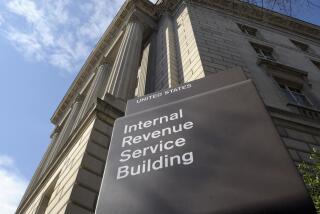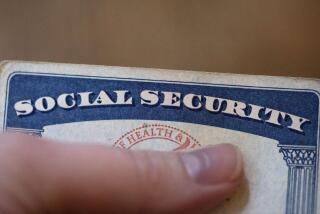Taxpayers not planning rebate spending spree

Most Americans are planning to use their stimulus rebate checks to pay down existing debt or add to their savings, not to fuel the kind of consumer spending that would bolster the economy, a new Los Angeles Times/Bloomberg poll has found.
Only 18% of respondents to the national poll said they intended to spend the money they will receive later this year from the federal government as part of an effort to inject cash into the sputtering economy. By contrast, 34% said they intended to save it and 31% intended to use it to pay existing debts. The rest thought that they either were not eligible for a rebate, would spend some and save some, would do “something else” with it or weren’t sure what they would do.
Among those who plan to pay down debt is Gayle Babykin, 64, of Vestal, N.Y., who has more than $5,000 in unpaid medical bills. Her only income is $1,100 a month in Social Security disability payments.
“Any money that comes in has to go to pay medical expenses,” Babykin said in an interview.
The rebate checks are the centerpiece of a $168-billion stimulus package passed by Congress and signed into law by President Bush this month as part of an effort to fend off an impending recession.
Jared Bernstein, an economist with the Democratic-leaning Economic Policy Institute, said lawmakers assumed that Americans would spend at least half of the money on new purchases.
“The estimates were all running on the assumption that consumers would spend as freely as they had in the past,” Bernstein said. “I’m pretty sure that’s wrong.”
Most single taxpayers with a taxable income of no more than $75,000 will get either $600 or a full refund of their 2007 tax paid, whichever is less. Most married couples who file a joint return and have a combined taxable income of no more than $150,000 will receive either $1,200 or, if less, a full refund of their 2007 tax paid. As income levels rise, the amount of the payment gets lower, with the payments phased out completely for single taxpayers with a taxable income of more than $87,000 and couples with a combined taxable income over $174,000. Eligible taxpayers also will receive $300 for each qualifying child age 16 or younger.
The poll suggested that even lower-income respondents -- those consumers most likely to spend the rebate right away on such necessities as food and fuel -- were instead leaning heavily toward using it to pay down existing debt. According to the poll, 37% of people in households making less than $40,000 a year intend to use the check to pay off debt, 30% intend to save it, and 18% will spend it on purchases.
The poll, conducted under the direction of Times Polling Director Susan Pinkus, has a margin of sampling error of plus or minus 3 percentage points.
John Silvia, chief economist for Wachovia Corp., said that an analysis of an earlier round of tax rebates sent in 2001 suggested that about two-thirds of such checks went to new purchases and one-third was saved or used to pay off debt. The ratio in the new Times/Bloomberg poll was “pretty much a flip” of that finding.
“It looks like you’re going to get a slightly more conservative consumer than you had in the past, and you’re going to see less stimulus kick in than you saw in the past,” Silvia said.
Bernstein suggested that the rise in household debt since 2001 may significantly dampen the rebates’ effect.
“For most households, their primary asset is their home -- and when that was appreciating, they were spending much more freely,” Bernstein said. “We’re now on the downside of that mountain, and this is what it looks like.”
Sue Banken, 49, was among those who said they would spend the rebate right away. Hers, she said, would go toward a new deck on her home in St. Paul, Minn.
“We do not have a lot of debt. That is under control, so we can afford to spend it,” she said. “I’m going to help with the housing slump as well -- I’m sure there will be a lot of contractors eager for the work.”
However, some economists noted that what consumers said they would do and what they actually ended up doing were not always the same. Carol Guthrie, a spokeswoman for the Senate Finance Committee, said that research on the 2001 rebates suggested that many of the checks were used to pay off credit card debt and that consumers boosted their spending in subsequent months by roughly the same amount.
“Some of the money is spent initially, and more is spent over a period of time -- and the finance committee took that into consideration when crafting the stimulus package,” Guthrie said.
The poll, which surveyed 1,408 adults by telephone Feb. 21-25, also found that Americans were deeply pessimistic about the economy. About 71% believe the economy is doing badly, and 61% believe that it is already in a recession. Few are hopeful that conditions will improve quickly -- 77% said they expected the economy to be about the same or in worse shape six months from now.
“I feel that we are going to see worse before it gets better,” said Babykin, who recently underwent chemotherapy treatments for cancer.
That kind of deep lack of confidence in the economy could delay a recovery, said Silvia: “This suggests this is not going to be a quick bounce back.”
Americans’ gloom over the economy has deepened markedly in the last month. A Times poll released Jan. 8 indicated that 31% thought the economy was doing “very badly.” About six weeks later, the percentage of those saying the economy was doing “very badly” had risen by 7 points, to 38%. Altogether, 71% of respondents polled this month said the economy was doing either “fairly badly” or “very badly.”
A majority of respondents, 58%, also said they thought the Bush administration had “not done enough” to address the housing crisis that triggered the current economic downturn. Those surveyed responded differently based on their political affiliation: 76% of Democrats and 33% of Republicans said the administration had not done enough, while 11% of Democrats and 54% of Republican thought it had.
A majority of independents also were dissatisfied with the administration’s efforts on housing -- 57% said the administration hadn’t done enough to fix the sub-prime mortgage crisis, 25% said it had, and 17% said they were not sure.
More to Read
Start your day right
Sign up for Essential California for news, features and recommendations from the L.A. Times and beyond in your inbox six days a week.
You may occasionally receive promotional content from the Los Angeles Times.






